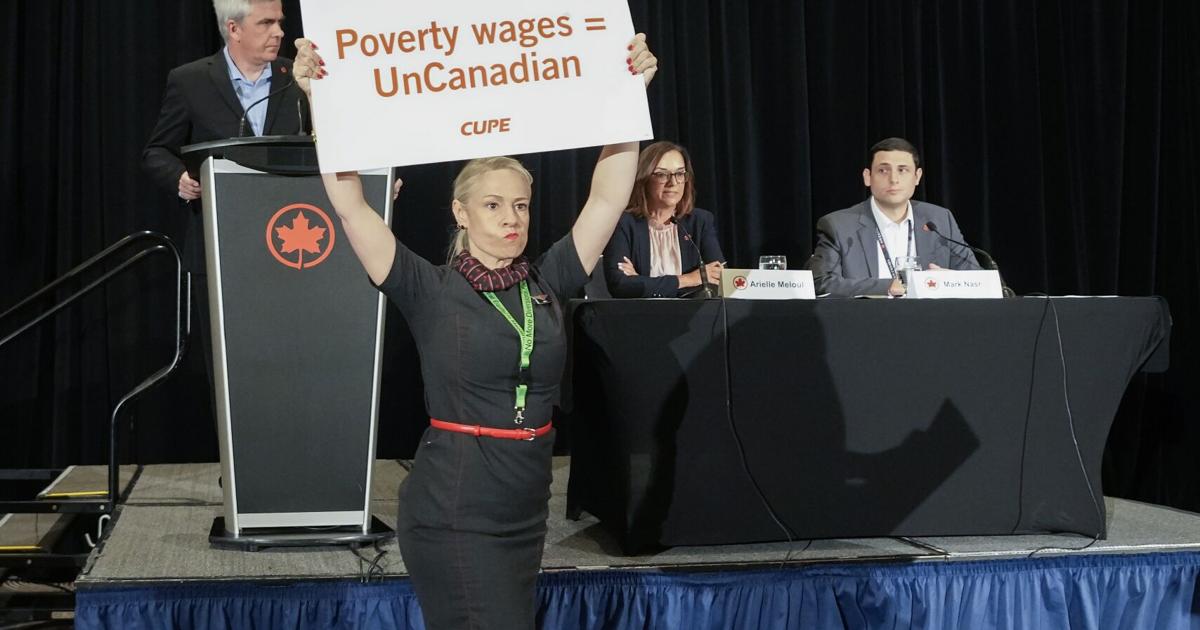The union for 10,500 flight attendants poised to walk off the job Saturday has rejected Air Canada’s request to federal jobs minister Patty Hajdu for binding arbitration to settle the negotiation stalemate.
“We will not surrender our members’ bargaining rights under any circumstances,” said Canadian Union of Public Employees spokesperson Hugh Pouliot. “The mere prospect of ministerial intervention has had a chilling effect on Air Canada’s obligation to bargain in good faith.”
The statement shared with the Star, reads in part, “such a decision would reaffirm the principles of free collective bargaining and compel Air Canada to return to the bargaining table — where it ought to be — and engage meaningfully in negotiations, where it is likely that the parties may be able to reach an agreement.”
The airline started cancelling Air Canada and Air Canada Rouge flights Thursday night and expected to cancel 500 flights Friday affecting 100,000 travellers.
In a press conference Thursday, Mark Nasr, executive V-P and COO of Air Canada, said the cancellations will affect 130,000 customers a day, including 25,000 Canadians who may be stranded abroad and that all flights would be paused by early Saturday.
Air Canada is “simply not the kind of system that we can start or stop at the push of a button,” Nasr said. “So in order to have a safe and orderly wind down, we need to begin now.”
First cancellations were mostly long-haul international flights scheduled to depart Thursday night, Nasr said, before expanding to hit more than 100,000 travellers Friday, and culminating in a full shutdown at 1 a.m. Saturday.
“We’re cancelling on a daily basis (after Saturday) because obviously we’re working on trying to resolve the labour dispute,” said Arielle Meloul-Wechsler, the airline’s chief human resources officer. So every morning, at 8 a.m., the flights for the next day get cancelled.”
The union also released a poll Friday, showing a majority of Canadians support the flight attendants and want the federal government to back off — even if it means travel disruptions.
The poll, conducted by Abacus Data shows 88 per cent of surveyed Canadians believe “flight attendants should be paid for all work-related duties including boarding, delays, and safety checks.”
A further 59 per cent, believe Ottawa should respect flight attendants’ “right to take job action,” and 76 per cent, support raising their pay “to reflect the important safety role they play.”
Only 19 per cent felt Air Canada’s wage offer is fair.
In an emailed statement to the Star, CUPE said Air Canada reinforces “the gender wage gap” by forcing Air Canada flight attendants — 70 per cent women — to accept a wage offer less than one-third what Air Canada offered its pilots less than a year ago.”
“Air Canada’s male-dominated workforce received a significant cost-of-living wage increase,” said Natasha Stea, head of Montreal’s CUPE unit. “Why not the flight attendants?
In 2024, Air Canada gave pilots — a male-dominated profession — a 26 per cent wage increase in year one of their new contract.
However, in 2025, Air Canada is offering flight attendants eight per cent in year one of their new contract, and a 17.2 per cent wage increase overall, over the life of a four-year deal.
“Air Canada gave pilots a better wage increase in one year than flight attendants will get over the entire life of their four-year contract if Air Canada gets its way,” CUPE said.
The Tourism Industry Association of Canada on Wednesday urged Ottawa to intervene “to protect Canada’s economy and tourism sector.”
“A strike during the peak August travel month would be catastrophic for the tourism and travel industry,” the statement read.
The Toronto Region Board of Trade also urged binding arbitration.
“This type of disruption hurts Canada’s global reputation as a reliable trading partner at a time when it is essential that we reinforce our diverse international economic relations,” a statement ready. “If we can’t deliver goods to market on time, our partners will look for permanent alternatives.”
The organization is urging both parties to “continue negotiations to avoid further disruption for Canadian air travellers and businesses,” said Toronto Region Board of Trade President & CEO, Giles Gherson.
More to come …
With files from Estella Ren



